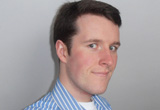 A recent article in The BMJ wondered whether portable ultrasound scanners might soon replace the trusty stethoscope. These ultrasounds are easy to use, sexy, cheap at only £5000(!), and lead to greater confidence at the examination couch. But forgive me if I’m not ready to swap my stethoscope for a tricorder just yet.
A recent article in The BMJ wondered whether portable ultrasound scanners might soon replace the trusty stethoscope. These ultrasounds are easy to use, sexy, cheap at only £5000(!), and lead to greater confidence at the examination couch. But forgive me if I’m not ready to swap my stethoscope for a tricorder just yet.
The invention of the stethoscope is credited to René Laennec, a particularly tuberculous Frenchman in the early 19th century. Worried by his own infectiousness, and the sensitivities of his patients, he created a stiff hollow tube to convey auscultated sounds from the patient’s chest to his ear. The bi-auricular rubber piping incarnation, to be worn with pride around the necks of generations of doctors and medical students, came later.
But the reputation of the stethoscope is hardly spotless. Studies have repeatedly shown that the heads of stethoscopes may harbor staphylococci and other nasties. This source of potential nosocomial infections can be readily decontaminated, but this is rarely done. Compared with the ubiquity of messages and signs advocating hand hygiene, the stethoscope falls under the infection control radar. In a 2013 survey of Edinburgh medical students, one in five had never cleaned their stethoscope. In comparison, nearly all cleaned their hands after every patient encounter.
If we are that bad at cleaning our instruments, will we really be much better with ultrasounds?
It has been argued that the capture and interpretation of ultrasound images is highly dependent on user skill. This is no different from the equivocal sounds heard via a stethoscope, yet we still insist medical students learn to use the latter. But will greater technology lead to greater, perhaps misplaced, confidence in uncertain findings? We are often reminded a good clinical examination can reduce false positives and unnecessary tests, but ultrasounds may actually lead to more false positives.
Besides, ultrasounds are notoriously poor at penetrating air spaces, so for respiratory exams the stethoscope remains the ace in the hole.
But there is so much more at stake. A stethoscope is a valuable substitute for a tendon hammer in a pinch. Will an ultrasound device be able to do that? There’ll never be an app for that. What of the stethoscope’s individuality? Engraved with your name to fend off kleptomaniac registrars, that particular shade of electric pink to accessorise with your favourite smart blouse, or you can even splash out on the medical bling of a Littman Cardiology III model to show you’ve got money to burn. The possibilities are endless. A stethoscope is as unique to the student as a wand is to a wizard from Harry Potter’s world—and both are equally capable of deep magic.
And can you boldly stride into the hospital canteen with an ultrasound device the way you can with a stethoscope? Slung around the neck, it declares to the world that, yes, everything will be fine now that the medical student is here. (Actually, that’s infuriating. Can we all agree to stop doing that?)
Lastly, what of one of the greatest uses of the stethoscope? In a hectic emergency room or a busy GP surgery, when the earbuds go in and the diaphragm is laid meaningfully on the chest, the stethoscope ferries the doctor or student to that quiet mental space. There, in silence save for the meditational lub…dub…lub…dub, there is the chance to think. In the rush of the 21st century, amid the blur of medical calculator apps and e-portfolio proformas, of QOFs and four hour targets, of OSCES and exams, what will become of that little space where the doctor or student can synthesise, diagnose, and reflect? Will the next generation of ultrasounds have an app for that?
I’m sure in ten years’ time, the medical students of tomorrow will be striding around with their new ultrasound devices in personalised holsters, and I will have been denounced as a Luddite who railed against the innovation and improvement of medicine. That’s fine. But I’m not ready to give up my stethoscope. Not just yet.
Rhys Davies is a final year medical student at Imperial College London. He is currently working as a Clegg Scholar in The BMJ offices.
This blog is based on an earlier blog that appeared at www.thelancetstudent.com.